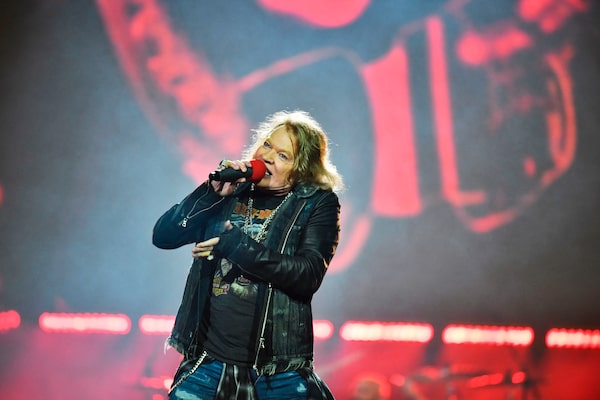These are incredibly strange times, and if you still aren’t convinced, consider this: Axl Rose has been lecturing the President of the United States about climate change.
Although Donald Trump seems to be a fan of Guns N’ Roses – he has played Sweet Child O’ Mine at his rallies – the feeling is not mutual. Like Rihanna and Aerosmith, Axl wants his music off of Republican playlists.
The GNR frontman began tweeting his criticism of the Trump administration soon after the election in November, 2016, and has not let up since. This week, after Mr. Trump blamed “poor” forest management for the California wildfires that have killed at least 42 people, Axl had a quick comeback.
Any “purported” mismanagement was due to “lack of federal funding,” he wrote. “Only a demented n’ truly pathetic individual would twist that around n’ use a tragedy to once again misrepresent facts for attempted public/political gain …”
Well, I did not see that one coming.

Axl Rose, lead singer of the US rock band Guns N' Roses, performs during a concert at the Friends Arena in Stockholm, Sweden, on June 29, 2017.AFP Contributor
Many Guns N’ Roses songs are undeniable jams, and much of Axl’s history is undeniably gross. It would be easy to assume he’d be a Trump supporter: His 1988 song One in a Million has vicious lyrics targeting immigrants, black people and gay men, right in line with the President’s agenda.
The band’s catalogue is full of misogyny, too, and it’s impossible to put space between the musician and his lyrics. Police records confirm extreme violence against his ex-wife in the same era that he wrote and sang the song Used To Love Her, which goes like this: “I used to love her, but I had to kill her. I had to put her six feet under, and I can still hear her complain." She’s not the only woman to accuse him of assault.
It’s a past that would be hard to redeem, but oh, I want to believe. The roster of artists whose shady politics or blemished personal lives make it hard to enjoy their work grows endlessly, which is exhausting. Axl, at least, seems to have gotten smarter.
On a larger scale, #MeToo has drawn up an equally long list of men who want to be forgiven for their ugly pasts. At some point in the future, we’ll have to figure out what is required of them.
Axl’s own past makes much of his behaviour unsurprising. As a terrific 2006 GQ profile puts it, he is more or less from “nowhere,” a part of Indiana known to be a “Klan hot spot.” His childhood, he has said, was full of violence.
That includes being sexually abused by his biological father – “I got a lot of violent, abusive thoughts toward women out of watching my mom with this man,” he said about him in a 1992 Rolling Stone interview. His siblings have confirmed that his stepfather also hit them.
None of that is an excuse for his actions later in life, but it is a compelling reason to offer sympathy. The musician has talked openly about being in therapy, and perhaps he is atoning.
Even before the Trump stuff, one 2016 incident was particularly meaningful. That September, a Latin American waitress made headlines after customers left her a note instead of a gratuity – one that read “we only tip citizens.” Axl flew her to a show and, although notoriously private, invited her backstage and posed for pictures.
This past spring, One in a Million was noticeably left out of a GNR box set. The burden of that song is his: The rest of the band has long said the singer insisted it appear on their second album.
Hateful songs about women, though, weren’t excised from the band’s catalogue, and are a shared offense. Just last year, original members Slash and Duff McKagan (who has also criticized the current administration) played Used To Love Her when the band reunited at Madison Square Garden. This fall, Slash told an interviewer that their lyrical sexism should not “be taken seriously,” because it wasn’t “malicious."
That’s a weak excuse. It’s also not very different from how the President and his staff brush aside accusations of their own misogynist behaviour.
Which means that, alas, Guns N’ Roses can still only be enjoyed with an asterisk. Axl still has work to do, but hopefully all we need is a little patience.